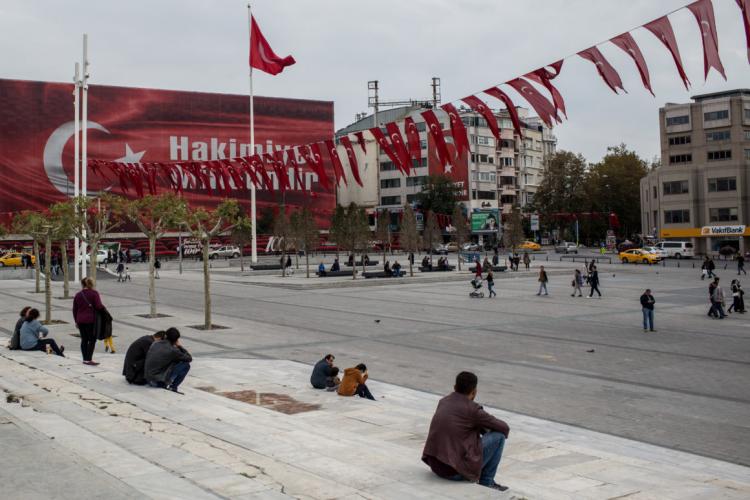
For Turkey’s academics, the new year began with a new wave of dismissals. With 2017 not yet a week old, 631 researchers and professors lost their jobs with the stroke of a pen.
In the course of the past year, thousands of Turkish scholars were fired or suspended in a similar manner, victims of the government’s sweeping purge following last summer’s failed coup. More than a dozen universities were simply shut down by decree.
The increasingly repressive atmosphere has spurred hundreds to leave the country, turning to Western countries, particularly in Europe, to escape prosecution and a steady erosion of academic independence.
Organizations dedicated to helping academics have registered an “unprecedented” surge in requests from Turkish scholars. On the Scholar Rescue Fund’s list of academics seeking placement, the majority are Turks.
In the fall, the German Philipp Schwartz Initiative received more applications from Turkey than Syria or other nations embroiled in war.
Leaving isn’t an easy choice to make. Those who are part of the brain drain not only lament the loss of their home; they are also plagued by the fear that the exodus of academics and intellectuals will accelerate Turkey’s descent into autocracy.
“Most of us are in Europe, in Germany especially. We’re a sizeable group here” — Halil Ibrahim Yenigün, professor fired from Istanbul’s Commerce University
“What’s being constructed is a single-minded society — an authoritarian society,” said a sociologist who now lives in Europe. “No critical mindset is possible. No independent thinking.”
Even before the attempted coup, the government had begun putting pressure on academics. When more than 1,400 scholars signed a petition calling for a halt to the government’s brutal crackdown on the renewed insurgency in the Kurdish-majority southeast, President Recep Tayyip Erdoğan vilified the signatories as terrorist sympathizers, sparking a campaign to investigate them for spreading “propaganda” on behalf of Kurdish militants.
Several hundred academics were suspended by their universities for signing the petition and state prosecutors launched a criminal investigation. Some professors were placed in pre-trial detention, others were harassed at work. By spring, dozens had lost their jobs and many fled abroad.
The German broadcaster Deutsche Welle estimates that between 100 and 150 of those who signed the petition eventually fled to Germany.
“A good number of the Academics for Peace are now abroad,” said Halil Ibrahim Yenigün, a professor who was fired from Istanbul’s Commerce University after signing the petition last year. “Most of us are in Europe, in Germany especially. We’re a sizeable group here,” he said in a Skype call from Berlin, where he has secured a fellowship.
In other ways, too, opportunities are narrowing for Turkish academics.
Kati Piri, the EU’s Turkey rapporteur, said she was concerned that Turkey had canceled academic partnerships such as the European Jean Monnet scholarship shortly after the coup attempt. “We’ve written many letters about this, and the Commission has put great pressure on Turkey to continue these activities and not punish its intellectuals for the coup,” she said.
Losing the dream of a modern, open country
Turkey has suffered brain drain before. After several military coups in the second half of the 20th century, particularly after the 1980 putsch, intellectuals left the country in droves. But after Erdoğan and his Justice and Development Party (AKP) rose to power in 2002, some felt inspired to come back.
In those early days, the AKP was a spark of hope: a party that modernized the country, boosted the sluggish economy and dismantled the power of the military. The new government also repealed the campus ban on headscarves that had kept millions of women out of university. The number of universities more than doubled under AKP rule, from 76 in 2002 to 178 in 2016, enticing many foreign-educated academics to return.
“We had this dream that Turkey would get more and more democratic. So we came back to contribute to the development of the country. I was one of them,” said Yenigün, who completed his Ph.D. at the University of Virginia. “There were suddenly all these European projects like Erasmus, students were getting more open-minded, changing for the better.”
A psychologist, who spoke on condition of anonymity, said she moved to Turkey in 2012 after spending her entire life abroad.
“My father emigrated for his Ph.D., and I’d always criticized the brain drain aspect of his leaving,” she said. “That’s part of the reason why I wanted to be here in the first place. If people constantly try to leave, there is no one left to make changes for the better. That’s why I came, that’s why I wanted to stay.”
She has since decided to leave. Having signed the peace petition, she is being investigated by the state and has difficulties conducting her research, which often takes her to political gatherings and the Kurdish region.
“Every time you do research, you have to go through this ethics committee. And my ethics committee isn’t very ethical,” she said. “They’re refusing my research, saying that they don’t want to draw attention to the university.”
“The government calls us unpatriotic. I don’t believe in these concepts. I don’t believe in patriotism. But if you want to put it that way, they are unpatriotic” — Halil Ibrahim Yenigün
The psychologist and the other scholars who spoke to POLITICO unanimously expressed pessimism about Turkey’s future. “Any chance for a bottom-up influence on everyday politics is gone,” she said. “When you have a brain drain, there’s no chance for any kind of new perspective because everyone who thinks differently is either forced to or is trying to leave.”
The vagaries of history
At the Alexander von Humboldt Foundation in Bonn, the staff are watching the situation in Turkey closely. In 2016, the Foundation launched its Philipp Schwartz Initiative for threatened scholars as a response to the arrival of over a million refugees.
Last March, during the first application round, the largest number of requests came from Syrians. In the latest round, Turks make up 46 percent of applicants – more than any other single group.
It marks an odd historic twist. The program takes its name from Philipp Schwartz, an Austro-Hungarian pathologist who was dismissed from Frankfurt’s Goethe University in 1933 for being Jewish. After fleeing to Switzerland, he founded the Emergency Association of German Scientists Abroad, helping other refugee academics find employment in exile.
“We very much hope the situation will change so that the academic community in Turkey can work as they used to, without these cases of threats and suspensions” — Georg Scholl
Significantly, Schwartz persuaded the Turkish government to give German professors positions at local universities and at least 150 persecuted academics eventually found safety and employment in Turkey. Schwartz himself became the head of pathology at Istanbul University.
“I wouldn’t speak of tragic irony, but the contrast is visible,” said Georg Scholl, a spokesman for the Humboldt Foundation. “We very much hope the situation will change so that the academic community in Turkey can work as they used to, without these cases of threats and suspensions.”
But programs like these are few and far between. Many academics who leave the country just pack a bag and hope for the best. And professors often worry about the students they leave behind.
Yenigün said some of the students who supported him were beaten up by ultranationalists. “The university backed them,” he said. “Not the beaten students, but those who did the beating.”
He added: “The government calls us unpatriotic. I don’t believe in these concepts. I don’t believe in patriotism. But if you want to put it that way, they are unpatriotic. They are betraying the future of this country.”
